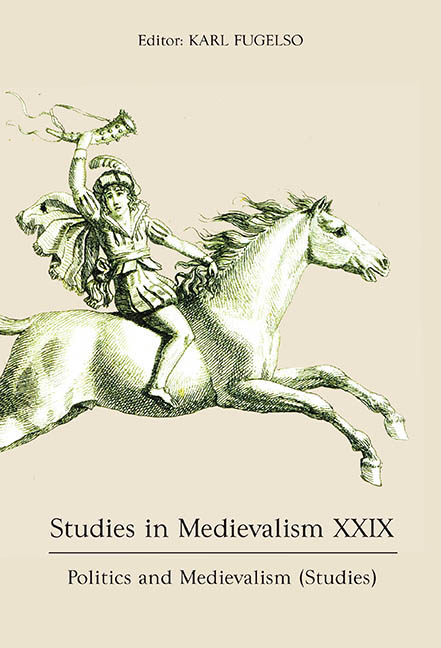Book contents
- Frontmatter
- Studies in Medievalism
- Acknowledgments
- Contents
- List of Illustrations
- Preface
- I Essays on Politics and Medievalism (Studies)
- Historical Malapropism and the Medieval Blood Libel in American Politics
- Putin’s Medieval Weapons in the War against Ukraine
- The Battle of Tours and the US Southern Border
- Medievalism, Brexit, and the Myth of Nations
- An Arthur for the Brexit Era: Joe Cornish’s The Kid Who Would be King
- II Other Responses to Medievalism
- Angle-ing for Arthur: Erasing the Welsh in Guy Ritchie’s King Arthur: Legend of the Sword
- Chasing Freyja: Rape, Immigration, and the Medieval in Alt-Right Discourse
- “Things painted on the coarse canvas”: Political Polemic in Jean-Paul Laurens’s Portrait of the Child Emperor Honorius
- Longfellow and Old English
- Archaeology and Medievalism at Julian of Norwich’s Anchorite Cell
- A Revelation of Love: Christianity, Julian of Norwich, and Medieval Pity in the Harry Potter Series
- In the Beginning Was the Word: How Medieval Text Became Fantasy Maps
- Objectivity, Impossibility, and Laughter in Doctor Who’s “Robot of Sherwood”
- Sonic Medievalism, World Building, and Cultural Identity in Fantasy Video Games
- Contributors
- Miscellaneous Endmatter
An Arthur for the Brexit Era: Joe Cornish’s The Kid Who Would be King
Published online by Cambridge University Press: 19 August 2020
- Frontmatter
- Studies in Medievalism
- Acknowledgments
- Contents
- List of Illustrations
- Preface
- I Essays on Politics and Medievalism (Studies)
- Historical Malapropism and the Medieval Blood Libel in American Politics
- Putin’s Medieval Weapons in the War against Ukraine
- The Battle of Tours and the US Southern Border
- Medievalism, Brexit, and the Myth of Nations
- An Arthur for the Brexit Era: Joe Cornish’s The Kid Who Would be King
- II Other Responses to Medievalism
- Angle-ing for Arthur: Erasing the Welsh in Guy Ritchie’s King Arthur: Legend of the Sword
- Chasing Freyja: Rape, Immigration, and the Medieval in Alt-Right Discourse
- “Things painted on the coarse canvas”: Political Polemic in Jean-Paul Laurens’s Portrait of the Child Emperor Honorius
- Longfellow and Old English
- Archaeology and Medievalism at Julian of Norwich’s Anchorite Cell
- A Revelation of Love: Christianity, Julian of Norwich, and Medieval Pity in the Harry Potter Series
- In the Beginning Was the Word: How Medieval Text Became Fantasy Maps
- Objectivity, Impossibility, and Laughter in Doctor Who’s “Robot of Sherwood”
- Sonic Medievalism, World Building, and Cultural Identity in Fantasy Video Games
- Contributors
- Miscellaneous Endmatter
Summary
Since the fateful June 2016 referendum that triggered the United Kingdom's potential coming withdrawal from the European Union, British politics have been, to put it mildly, tumultuous. Contentious from its very beginnings, especially with the formation of the far-right UK Independence Party in the early 1990s, the decades-long push toward what came to be known as Brexit is seen by many as a distinctly conservative, openly nationalistic movement rooted in the exclusion of non-white peoples and cultures from Great Britain. Its engineers, including former UKIP leader Nigel Farage, stand accused of stoking the fires of intranational division through targeted campaigns of misinformation, and public opinion in the nation remains at odds. Following more than two years of negotiations and deadline extensions, former Prime Minister Theresa May's government was unable to pass any concrete plans for the withdrawal through Parliament, ultimately leading to her own resignation in June 2019. Indeed, more than half of British citizens polled after the 2017 General Election appear to favor remaining in the EU or believe that the Brexit vote itself was a mistake, but with the accession of pro-Brexit former London mayor Boris Johnson to Downing Street following May's resignation, the future of Britain's place in the EU at the present historical moment remains uncertain.
Amid this turmoil, however, premiered a film that sought to examine some of the tacit ideologies of Brexit-era UK politics for an audience of children through a perhaps surprising take on the medieval legend of King Arthur. Writer/director Joe Cornish's The Kid Who Would Be King opened in the UK on February 15, 2019, one month to the day after Theresa May's historic loss in the House of Commons, and although the film was by all accounts a failure at the box office, it was favorably reviewed by critics, and not without good reason. Cornish's narrative pits present-day protagonist Alex, a bullied schoolboy unexpectedly found in possession of the legendary sword Excalibur, against a newly resurrected Morgana le Fay and her army of the dead. He is aided in his journey by the wizard Merlin and a multicultural assemblage of friends and former enemies named for Arthurian knights, including blond-haired, blue-eyed Lance, the South Asian Bedders, fondly called “Sir Beddersvere,” and Kaye, portrayed as a black girl.
- Type
- Chapter
- Information
- Studies in Medievalism XXIXPolitics and Medievalism (Studies), pp. 39 - 46Publisher: Boydell & BrewerPrint publication year: 2020



